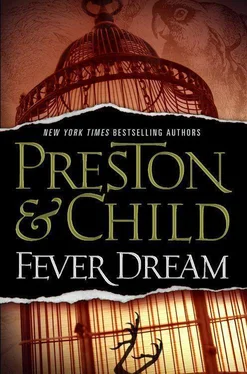Douglas Child - Fever Dream
Здесь есть возможность читать онлайн «Douglas Child - Fever Dream» весь текст электронной книги совершенно бесплатно (целиком полную версию без сокращений). В некоторых случаях можно слушать аудио, скачать через торрент в формате fb2 и присутствует краткое содержание. Жанр: Триллер, на английском языке. Описание произведения, (предисловие) а так же отзывы посетителей доступны на портале библиотеки ЛибКат.
- Название:Fever Dream
- Автор:
- Жанр:
- Год:неизвестен
- ISBN:нет данных
- Рейтинг книги:3 / 5. Голосов: 1
-
Избранное:Добавить в избранное
- Отзывы:
-
Ваша оценка:
- 60
- 1
- 2
- 3
- 4
- 5
Fever Dream: краткое содержание, описание и аннотация
Предлагаем к чтению аннотацию, описание, краткое содержание или предисловие (зависит от того, что написал сам автор книги «Fever Dream»). Если вы не нашли необходимую информацию о книге — напишите в комментариях, мы постараемся отыскать её.
Fever Dream — читать онлайн бесплатно полную книгу (весь текст) целиком
Ниже представлен текст книги, разбитый по страницам. Система сохранения места последней прочитанной страницы, позволяет с удобством читать онлайн бесплатно книгу «Fever Dream», без необходимости каждый раз заново искать на чём Вы остановились. Поставьте закладку, и сможете в любой момент перейти на страницу, на которой закончили чтение.
Интервал:
Закладка:
Esterhazy rose and strolled along the brick path leading through the little park. The glow from the parking lot did not penetrate far, leaving most of the area in darkness. This would have made a good place to shoot from--if he'd been using the sniper rifle. But of course that would not work. When the two arrived, they would park as close to the main entrance as possible, jump out, and run into the building--a continually moving target. After his failure with Pendergast outside Penumbra, Esterhazy did not care to repeat the challenge. He would take no risks this time.
Hence the sawed-off shotgun.
He walked back toward the hospital entrance. It offered a far more straightforward opportunity. He would position himself on the right-hand side of the walkway, between the area lights. No matter where Pendergast and Hayward parked, they'd have to pass right by him. He would meet them there in his doctor's uniform, clipboard in hand, head bowed over it. They would be worried, rushing, and he'd be a doctor--there would be no suspicion. What could be more natural? He'd let them approach, get out of the line of sight of anyone inside the double glass doors. Then he'd swing up the sawed-off from under his lab coat and fire from the hip at point-blank range. The double-ought buck would literally blow their guts and spinal cords out through their backs. Then all he had to do was walk the twenty feet to his own car, get in, and drive away.
With his eyes closed he ran through the sequence, counting off the time. Fifteen seconds, more or less, beginning to end. By the time the security guard at the reception desk called for backup and screwed up the courage to get his fat ass outside, Judson would be gone.
This was a good plan. Simple. Foolproof. His targets would be off guard, exposed. Even the legendarily cool Pendergast would be flustered. No doubt the man blamed himself for D'Agosta's condition--and now his good friend was dying.
The only danger, and it was a slight one, would be if someone accosted or challenged him in the hospital before he had time to act. But that didn't seem likely. It was an expensive private hospital, big enough that no one had looked twice at him when he walked in and flashed his credentials. He had gone straight to D'Agosta's room and found him drugged up with painkillers, sound asleep after the operation. They hadn't posted a guard, evidently because they felt they'd disguised his identity well enough. And he had to admit they'd done a brilliant job at that, all the paperwork in order, everyone in the hospital thinking he was Tony Spada from Flushing, Queens...
Except that he was the only patient in the entire region needing a forty-thousand-dollar porcine aortic valve xenograft.
He'd injected the Pavulon high up in the IV drip. By the time the code came through, he was in another part of the hospital. No one questioned him or even looked askance at his presence. Being a doctor himself, he knew exactly how to look, how to behave, what to say.
He checked his watch. Then he strolled over to his car and got in. The shotgun gleamed faintly from the floor of the passenger seat. He'd stay here, in the darkness, for a little while. Then he'd hide the shotgun under his coat, exit the vehicle, get into position between the lights... and wait for the birds to fly in.
* * *
Hayward could see the hospital at the end of the long, straight access drive, a three-story building glowing in the night, set amid a broad rising lawn, its many windows reflecting on the waters of a nearby pond. She accelerated, the road dipping down to cross a stream, then rising up again. As she approached the entrance she braked hard, making an effort to get her excessive speed under control, came into the final curve before the parking lot, the tires squealing softly on the dew-laden asphalt.
She came to a short, screeching halt in the closest parking space, threw open the door, and jumped out. She trotted across the lot and entered the covered walkway to the front doors. Immediately she saw a doctor standing to one side of the walkway, between the pools of light, holding a clipboard. A surgical mask was still in position on his face--he must have just come from the OR.
"Captain Hayward?" the doctor asked.
She veered toward him, alarmed at the thought he was waiting for her. "Yes, how is he?"
"He's going to be just fine," came the slightly muffled response. The doctor let the clipboard drop casually in one hand while he reached under his white coat with the other.
"Thank God--" she began, and then she saw the shotgun.

59
New York City
DR. JOHN FELDER MOUNTED THE BROAD STONE steps of the main branch of the New York Public Library. Behind him, the evening traffic on Fifth Avenue was a staccato chorus of horns and grinding diesels. He paused a moment between the large stone lions, Patience and Fortitude, to check his watch and rearrange the thin manila folder that was tucked beneath one arm. Then he made his way to the brass doors at the top of the stairs.
"I'm sorry, sir," said the guard standing before them. "The library is closed for the day."
Felder took out his city credentials and showed them to the man.
"Very good, sir," said the guard, stepping deferentially away from the doors.
"I put in a request for some research materials," Felder said. "I was told they were ready for examination."
"You can inquire in the General Research Division," the guard replied. "Room Three Fifteen."
"Thank you."
His shoes rang out against the floor as he walked through the vast and echoing entrance hall. It was almost eight in the evening and the cavernous space was deserted save for a second guard at a receiving station, who again examined his credentials and pointed the way up the sweeping staircase. Felder mounted the marble stairs slowly and thoughtfully. Arriving at the third floor, he walked down the corridor to the entrance of Room 315.
Room 315 did not do the space justice. Nearly two city blocks long, the Main Reading Room rose fifty feet to a rococo coffered ceiling busy with murals. Elegant chandeliers hung over seemingly endless rows of long oaken reading tables, still appointed with their original bronze lamps. Here and there, other researchers with after-hours access sat at the tables, poring over books or tapping quietly on laptops. While many books lined the walls, they were merely a drop in the library's bucket: in the subterranean levels beneath his feet, and the others below the green surface of adjoining Bryant Park, six million more volumes were stored.
But Felder had not come here to look at books. He had come for the library's equally vast collection of genealogical research materials.
He walked to the research assistance station that bisected the room, itself made of ornately carved wood, as large as a suburban house. After a brief whispered exchange, a library cart full of ledgers and folders was presented to him. He wheeled it to the nearest table, then took a seat and began placing the materials on the polished wooden surface. They were darkened and foxed with age but nevertheless impeccably clean. The various documents and sets of records had one thing in common: they dated from 1870 to 1880, and they documented the area of Manhattan in which Constance Greene claimed to have grown up.
Ever since the commitment proceedings, Felder had been thinking about the young woman's story. It was nonsense, of course--the ravings of someone who had completely lost touch with reality. A classic case of circumscribed delusion: psychotic disorder, unspecified.
And yet Constance Greene did not present like the typical person totally out of touch with reality. There was something about her that puzzled--no, intrigued --him.
Читать дальшеИнтервал:
Закладка:
Похожие книги на «Fever Dream»
Представляем Вашему вниманию похожие книги на «Fever Dream» списком для выбора. Мы отобрали схожую по названию и смыслу литературу в надежде предоставить читателям больше вариантов отыскать новые, интересные, ещё непрочитанные произведения.
Обсуждение, отзывы о книге «Fever Dream» и просто собственные мнения читателей. Оставьте ваши комментарии, напишите, что Вы думаете о произведении, его смысле или главных героях. Укажите что конкретно понравилось, а что нет, и почему Вы так считаете.











